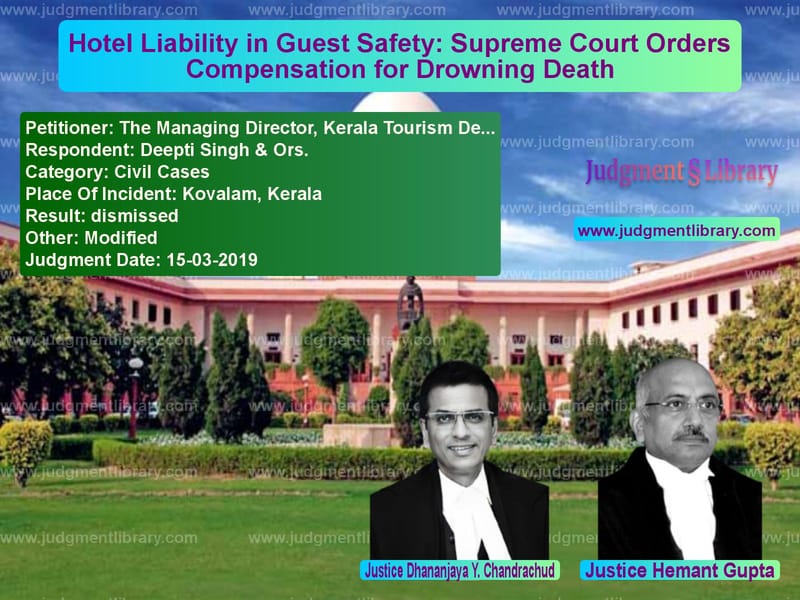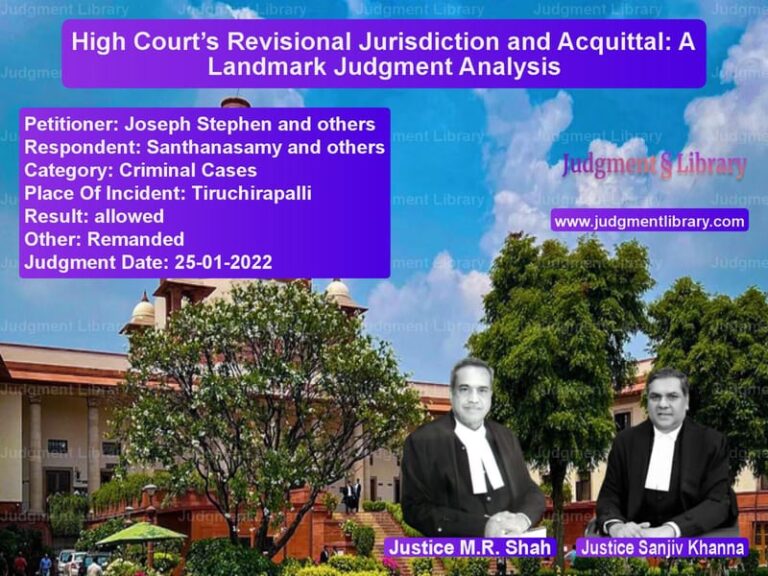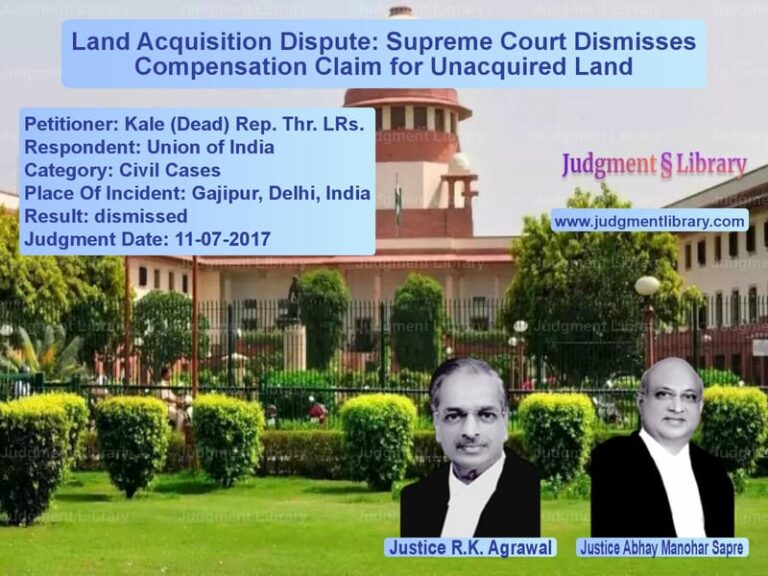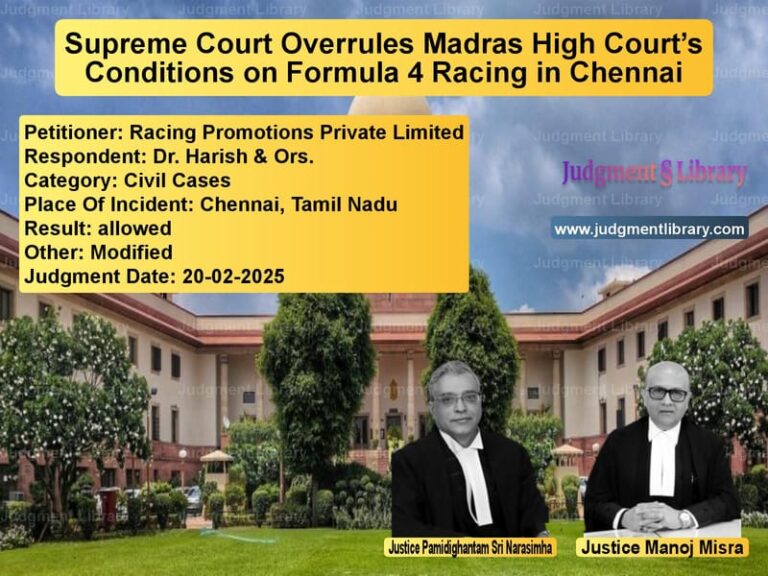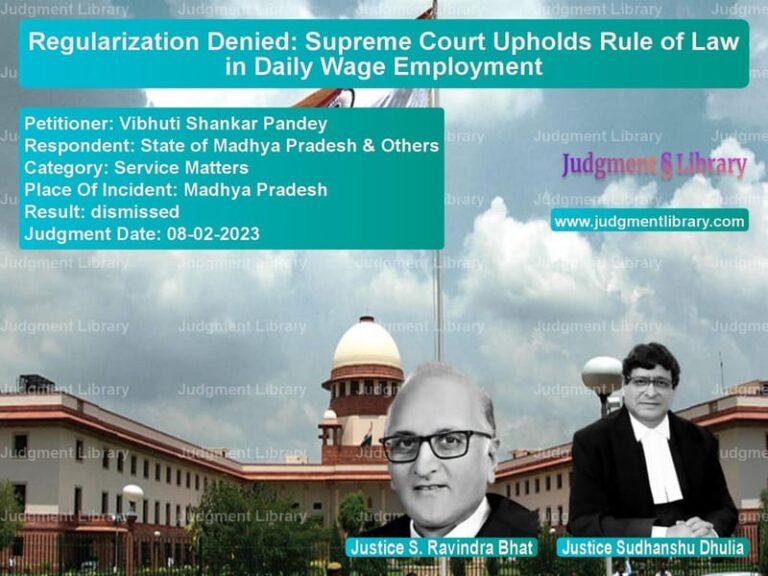Hotel Liability in Guest Safety: Supreme Court Orders Compensation for Drowning Death
The case of The Managing Director, Kerala Tourism Development Corporation Ltd. vs. Deepti Singh & Ors. is a landmark judgment addressing the duty of care owed by hotels to their guests. The Supreme Court of India, in its judgment dated March 15, 2019, examined whether a hotel’s negligence led to the drowning death of a guest in its swimming pool and upheld a significant compensation awarded by the National Consumer Disputes Redressal Commission (NCDRC).
The case arose when Satyendra Pratap Singh, a guest at Hotel Samudra in Kovalam, Kerala, drowned in the hotel’s swimming pool. His family alleged negligence on the part of the hotel management due to the absence of a dedicated lifeguard. The Supreme Court, after reviewing the evidence, found the hotel liable and directed an enhanced compensation with interest.
Background of the Case
The incident occurred on March 21, 2006, between 6:30 and 7:00 p.m. at the swimming pool of Hotel Samudra, operated by Kerala Tourism Development Corporation Ltd. (KTDC). Satyendra Pratap Singh, a businessman, was on a family vacation with his wife Deepti Singh and their two minor children. He entered the pool with his brother but suddenly became unconscious and sank. Other hotel guests were present at the time.
The key allegations by the family were:
- No dedicated lifeguard was present at the pool.
- The hotel’s lifeguard was assigned bartending duties, making him unavailable for immediate rescue.
- A foreign guest, not the hotel staff, pulled the deceased out of the water.
- Despite being rushed to the hospital, Satyendra Pratap Singh was declared dead at 9:30 p.m.
Legal Issues Raised
- Did the hotel have a duty of care to ensure guest safety at the swimming pool?
- Was there a breach of this duty, leading to the drowning?
- Should a lifeguard be assigned other responsibilities, such as bartending?
- What is the appropriate compensation for negligence in such cases?
Arguments by the Petitioner (Kerala Tourism Development Corporation Ltd.)
The KTDC, represented by senior counsel, contended:
- The hotel had a lifeguard on duty who assisted in pulling the victim from the water.
- It was inexplicable how a healthy 35-year-old man could suddenly drown.
- The NCDRC wrongly found negligence based on assumptions.
- The compensation awarded was excessive and required reconsideration.
Arguments by the Respondent (Deepti Singh & Ors.)
The respondents, represented by senior counsel, argued:
- The lifeguard was also assigned as a bartender, which distracted him from pool supervision.
- The absence of a vigilant lifeguard led to a delayed response in rescuing the deceased.
- The hotel failed to follow the safety guidelines issued by the National Institute of Water Sports, which specify that lifeguards should not be assigned additional duties.
- The compensation awarded should be enhanced, considering the deceased was a businessman with high future earning potential.
Supreme Court’s Judgment
The Supreme Court upheld the NCDRC’s finding of negligence and ruled:
- A hotel has a legal duty of care to ensure the safety of its guests.
- Assigning bartending duties to the lifeguard was a clear breach of duty.
- The hotel failed to provide a safe environment at the swimming pool.
- The negligence directly contributed to the guest’s drowning.
The Court observed:
“Allowing or designating a lifeguard to perform the duties of a Bartender is a clear deviation from the duty of care. Mixing drinks does not augur well in preserving the safety of swimmers.”
Compensation Awarded
The Supreme Court upheld the compensation of Rs. 62,50,000 awarded by the NCDRC but modified the interest calculation:
- The amount was to carry 9% interest per annum from the date of filing the complaint.
- The hotel was directed to pay the balance compensation within four months.
Key Takeaways from the Judgment
- Hotels must ensure safety: Assigning lifeguards other duties compromises guest safety.
- Negligence in duty of care can lead to significant liability.
- Consumer protection laws uphold guest rights: The NCDRC and Supreme Court reinforce liability for service deficiencies.
- Compensation for wrongful deaths: Courts consider earning potential and family suffering when awarding damages.
Conclusion
The Supreme Court’s ruling in The Managing Director, Kerala Tourism Development Corporation Ltd. vs. Deepti Singh & Ors. is a milestone in consumer protection and hotel liability. By holding the hotel accountable, the judgment reinforces the importance of safety regulations and fair compensation for negligence. It sends a strong message that businesses providing recreational facilities must ensure proper safeguards to prevent tragedies.
Petitioner Name: The Managing Director, Kerala Tourism Development Corporation Ltd..Respondent Name: Deepti Singh & Ors..Judgment By: Justice Dhananjaya Y. Chandrachud, Justice Hemant Gupta.Place Of Incident: Kovalam, Kerala.Judgment Date: 15-03-2019.
Don’t miss out on the full details! Download the complete judgment in PDF format below and gain valuable insights instantly!
Download Judgment: The Managing Directo vs Deepti Singh & Ors. Supreme Court of India Judgment Dated 15-03-2019.pdf
Direct Downlaod Judgment: Direct downlaod this Judgment
See all petitions in Damages and Compensation
See all petitions in Consumer Rights
See all petitions in Judgment by Dhananjaya Y Chandrachud
See all petitions in Judgment by Hemant Gupta
See all petitions in dismissed
See all petitions in Modified
See all petitions in supreme court of India judgments March 2019
See all petitions in 2019 judgments
See all posts in Civil Cases Category
See all allowed petitions in Civil Cases Category
See all Dismissed petitions in Civil Cases Category
See all partially allowed petitions in Civil Cases Category

